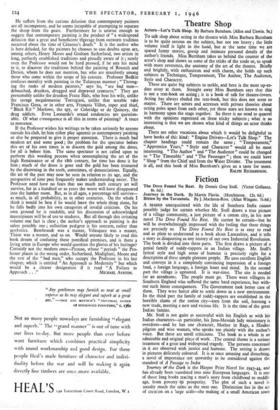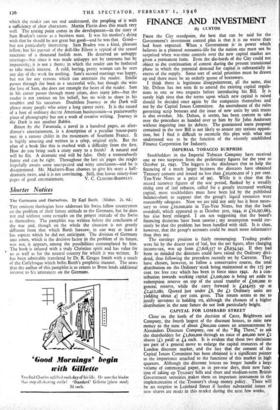Fiction
Journey in the Dark. By Martin Flavin. (Hutchinson. 12s. 6d.) Bitten by the Tarantula. By J. Maclaren-Ross. (Allan Wingate. 7s.6d.)
A READER unacquainted with the life of Southern India cannot possibly judge for certain whether Mr. Stoll draws a true picture of a village community, a just picture of a cotton city, in his new novel The Dove Found No Rest. He cannot be certain—but he will be overwhelmingly impressed with the feeling that these things are precisely so. The Dove Found No Rest is as easy to read and as plain to understand as a book about Lancashire, and it tells a story as disquieting as any history of our own Industrial Revolution. The book is divided into three parts. The first draws a picture of a genial family of toddy-tappers in an Indian village. Mr. Stoll's lyrical style and high sense of humour is precisely right for a description of these simple pleasant people. Pie uses excellent English and conveys in it a completely convincing impression of a foreign land, a foreign language, a foreign heart and mind. In the second part the village is uprooted. It is war-time. The site is needed for an aerodrome. The people must go. There were villagers in Southern England who suffered the same hard experience, but with- out such bitter consequences. The Government took better care of them. They were better able to settle down in a new environment. In the third part the family of toddy-tappers are established in the horrible slums of the cotton city—torn from the soil, learning a new trade, meeting a new and vicious life. It is the time of the great Indian famine.
Mr. Stoll is not quite as successful with his English as with his Indian characters—in particular, his Jesu-Messiah lady missionary is overdone—and he has one character, Mother in Rags, a Hindoo pilgrim and wise woman, who speaks too plainly with the author's voice. But these are small criticisms. The book as a whole is an admirable and original piece of work. The central theme is a serious treatment of a great and widespread tragedy. The persons concerned in it are observed with justice and humour. The setting is drawn in pictures delicately coloured. It is at once amusing and disturbing, a novel of importance not unworthy to be considered against the standard of A Passage to India
Journey irf the Dark is the Harper Prize Novel for 1943-44, and has already been translated into nine European languages. It is one of those long books tracing a man's story from childhood to middle age, from poverty to prosperity. The plot of such a novel is usually much the same as the next one. Distinction lies in the act of creation on a large scale—the making of a small American town which the reader can see and understand, the peopling of it with a sufficiency of clear characters. Martin Flavin does this much very well. The testing point comes in the development—in the story of Sam Braden's career as a business man. It was his mother's dying wish that he should be not great but good—and he was that. Good— but not particularly interesting. Sam Braden was a kind, pleasant fellow, but his pursuit of the doll-like Eileen is typical of the sexual reactions of a thousand foolish men. He deserved an unhappy marriage—but since it was made unhappy not by tantrums but by impassivity, it is not a theme in which the reader can be bothered to take much interest. A cold, boring, pretty woman can be seen any day of the week for nothing. Sam's second marriage was happy, but not for any reasons which can entertain the reader. Emilie passes through the book as a successful wife, but though she wins the love of Sam, she does not entangle the heart of the reader. Sam in his career passes through many crises, does many jobs—but the reader is not anxious on his behalf, has no wish to share in his troubles and his successes. Doubtless Journey in the Dark will please many people who enjoy a long career story. It is the record of a host of ordinary decent American businessmen—a praiseworthy piece of photography but not a work of creative writing. Journey in the Dark is not another Babbit.
Bitten by the Tarantula, a Hovel in a hundred pages, an after- dinner's- entertainment, is a description of a peculiar house-party met in a remote chalet in the mountains of Southern France. It is highly amusing and written in a crisp, original style. But the plan of a book like this is marked with a difficulty from the first. How do you bring such a crazy story to a finish? A natural end will be flat. A dramatic end will be false. Only a tremendously funny end can be right. Throughout the last six pages the reader hopefully awaits some unexpected and witty conclusion—and he is disappointed. Mr. Maclaren-Ross chooses to give his story a half- dramatic twist, and it is not convincing. Still, that leaves ninety-four



























 Previous page
Previous page